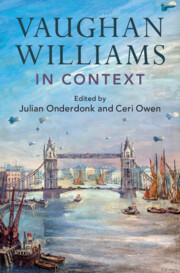Book contents
- Vaughan Williams in Context
- Composers in Context
- Vaughan Williams in Context
- Copyright page
- Dedication
- Contents
- Illustrations
- Graphs and Tables
- Musical Examples
- Notes on Contributors
- Acknowledgements
- Editorial Note
- Bibliographic Abbreviations
- Introduction
- Part I Biography, People, Places
- Chapter 1 London and the Modern City
- Chapter 2 Personality
- Chapter 3 Correspondents
- Chapter 4 Women
- Chapter 5 Friends Outside Music
- Chapter 6 Cambridge
- Part II Inspiration and Expression
- Part III Culture and Society
- Part IV Arts
- Part V Institutions
- Part VI Reception
- Further Reading
- Index of Works
- General Index
Chapter 3 - Correspondents
from Part I - Biography, People, Places
Published online by Cambridge University Press: 28 March 2024
- Vaughan Williams in Context
- Composers in Context
- Vaughan Williams in Context
- Copyright page
- Dedication
- Contents
- Illustrations
- Graphs and Tables
- Musical Examples
- Notes on Contributors
- Acknowledgements
- Editorial Note
- Bibliographic Abbreviations
- Introduction
- Part I Biography, People, Places
- Chapter 1 London and the Modern City
- Chapter 2 Personality
- Chapter 3 Correspondents
- Chapter 4 Women
- Chapter 5 Friends Outside Music
- Chapter 6 Cambridge
- Part II Inspiration and Expression
- Part III Culture and Society
- Part IV Arts
- Part V Institutions
- Part VI Reception
- Further Reading
- Index of Works
- General Index
Summary
In ‘Correspondents’, Hugh Cobbe reflects on the benefits for the study of composers that arise from the corpus of their letters. He describes the collection of the letters of Vaughan Williams, which he and his successor editors have built up to form a database of over 5,000 items that are publicly available online. Describing Vaughan Williams’s connections in terms of concentric circles of decreasing intimacy, he demonstrates what the correspondence reveals about the composer and his world. Relations with his two wives, Adeline and Ursula, are discussed and then relations with his close friends Ralph Wedgwood, Gustav Holst, Martin Shaw, Gerald Finzi, and Michael Kennedy. Thereafter the circles widen to include Adeline Fisher’s relations, his fellow composers, his Royal College of Music pupils, those conductors and soloists who regularly performed his works, his collaborators, and the critics who wrote about him. Cobbe also describes his concerns with non-musical issues, such as the release of interned German refugee musicians, and his enthusiasm for Federal Union as a movement for future peace. Overall, the letters provide a clear picture of Vaughan Williams’s breadth of vision and largeness of mind.
Keywords
- Type
- Chapter
- Information
- Vaughan Williams in Context , pp. 27 - 34Publisher: Cambridge University PressPrint publication year: 2024

